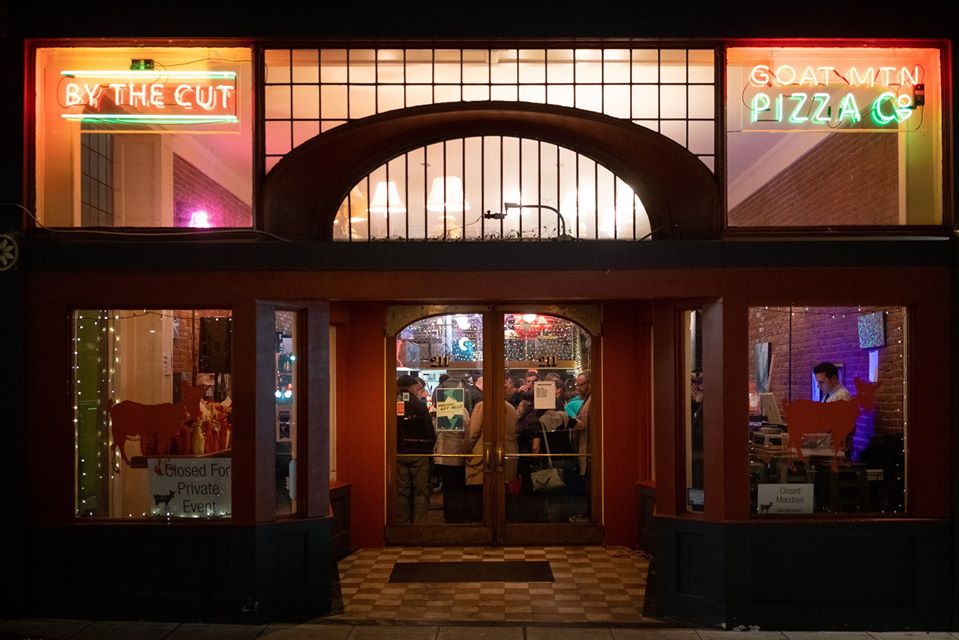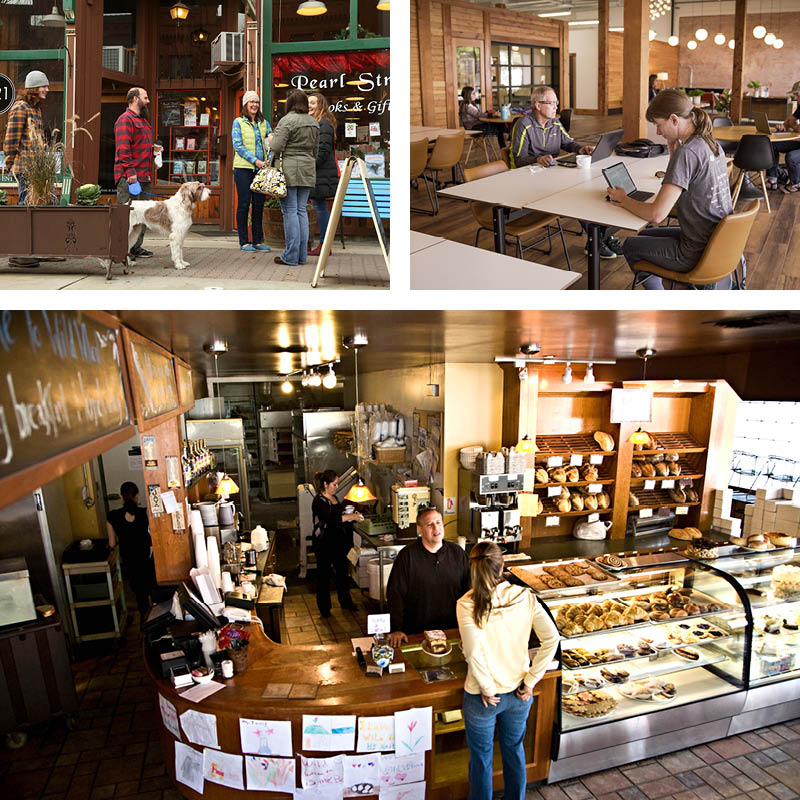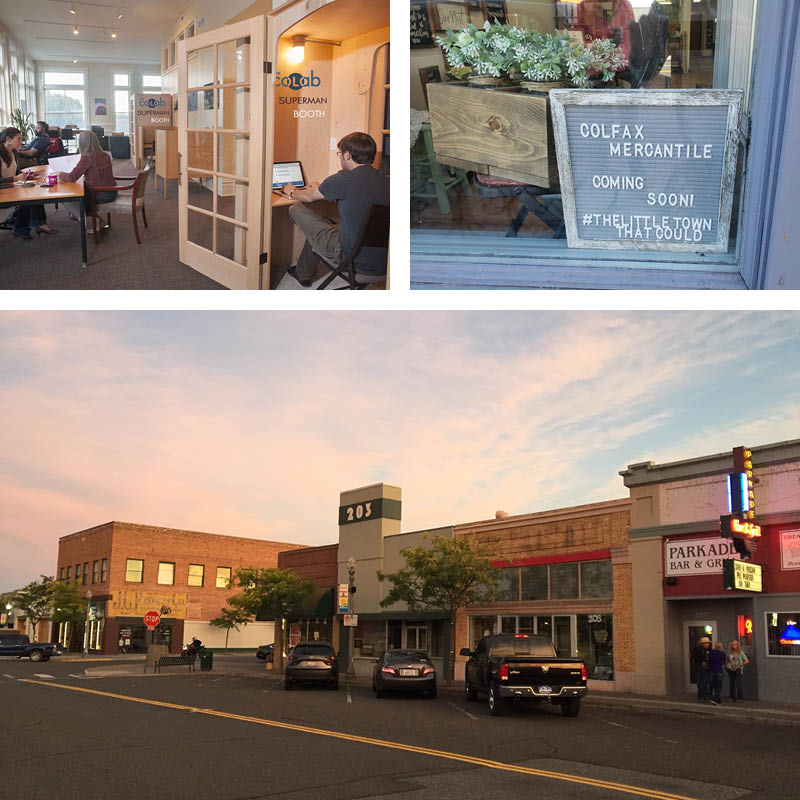Why Preservation Needs Small Business

Goat Mountain Pizza Co. in Bellingham, courtesy of Downtown Bellingham Partnership.
And why the preservation movement should use its voice during COVID-19
By Breanne Durham, Washington Trust for Historic Preservation
Urbanist Jane Jacobs is famously (and frequently) quoted as saying, “New ideas must use old buildings.” We see the reality of this every day in our Main Streets across the state – our historic commercial districts were built with entrepreneurship and community in mind, and they continue to foster those values more than a century later. You can’t synthetically create the small and diverse spaces, the social capital, and the inviting environment that occur organically in a downtown. When paired with community organizing (à la a local Main Street program) to spur investment and energy, there is no better place to open up shop than in a historic downtown district.
But let’s flip the coin and consider why preservation needs entrepreneurial energy just as much, if not more.
BUILDING VITALITY
What we know to be true from a quick glance down your nearest historic commercial district is confirmed by data in the National Trust for Historic Preservation’s 2014 study Older, Smaller, Better – there is a statistical relationship between small businesses and historic character. The dynamics created by human-scale buildings are more conducive to business start-ups and entrepreneurship.
“From a real estate perspective, the connection goes both ways,” said Mike Powe, Director of Research for the National Main Street Center. “These old, often locally-owned buildings need tenants who can build out their vision for their business in unique buildings and spaces, and smaller, entrepreneurial businesses need property owners who are willing to be flexible in structuring a lease agreement and can work with their often-more-limited lines of credit. The connection is just much more centered on the relationship between the property owner and business owner.”
Owners of historic buildings rely upon this trend just as much as small business owners rely upon the opportunity to locate in one of these unique spaces. To keep historic buildings economically viable, they need activity. Reliable tenants support the ongoing maintenance and preservation needs of an older building.
The economic benefits of tenanting small businesses include more than monthly rent checks. Take, for example, a typical mixed-use building in a downtown district. The ground floor will have one or more shops, ideally restaurants or retail, and, in a district that has invested strategically in its small business mix, the upper floors will be filled with offices or residents. Strong local economies like this create the atmosphere of quality and confidence that incentivizes property owners to preserve and restore their buildings.
“Small businesses are the economic engine that makes these older buildings relevant,” said Mary Thompson, Washington Trust board member. “Without a use, buildings are inconsequential at best and public nuisances at worst.”
Uses change over time, and it takes innovation and entrepreneurial spirit to reimagine existing, unique spaces. If I had a dime for every former department store that, for a time at the advent of malls, left a gaping hole in its downtown district – well, I’d invest all of that money into the breweries, tech start-ups, and small business incubators that have given those anchor buildings new life.
The economy is never stagnant, and to maintain its relevancy, our field must not be either. Former museum director and current Executive Director of the Historic Downtown Kennewick Partnership Stephanie Button understands that the preservation field must embrace small business as the pioneers for change we need. “There can be a tension between maintaining authenticity of original historic use with what it takes to maintain and operate the building,” said Stephanie. “Small businesses have the entrepreneurial spirit and vision to repurpose historic buildings that allow them to continue to be loved by the community.”

Above, clockwise from top left: Pearl Street Books and Gifts in Ellensburg, the Mercantile co-working space in Wenatchee, Wild Wheat Bakery in Kent.
BUILDING A MOVEMENT
If the above section seems to be slanted heavily toward preservation in a Main Street context, that’s not just my personal bias showing; that’s also my next point.
Most people don’t know that they care about preservation. The word itself – “preservation” – doesn’t resonate with broad audiences, and we as a field have barely begun the important work of better opening our doors to allow more people in to help us redefine it. If people don’t know that they care about preservation, we need to be meeting them where they are and talking about what they do care about.
“People seek character – they appreciate originality, and they want to create memories and unforgettable experiences,” said Mari Mullen, Executive Director of the Port Townsend Main Street Program. “The unique environments that our Main Street programs support bring out the best of what our communities have to offer.”
Since its inception four decades ago, the Main Street movement has been attracting people. Local Main Street programs, like the ones in Kennewick and Port Townsend, rely heavily on community engagement and volunteer leadership to accomplish their objectives of creating strong local economies rooted in historic preservation. People come out of the woodwork to volunteer for their local Main Street programs because they have personal connections to small businesses or general feelings of connectedness to the district.
Last year alone, Washington Main Street Communities reported 4,048 volunteers – that’s an average of more than 122 people volunteering for each local Main Street program in the state. Not only does this showcase a tremendous amount of energy and enthusiasm for the work of Main Street, which is largely focused on small business vitality, it also presents a huge audience of potential preservationists. I know I am in excellent company as a preservationist who was first a Main Street volunteer and advocate for my local business community.
SMALL BUSINESSES NEED YOU NOW
There has never been a more poignant time to reflect on the value small businesses have in our lives and in our work. The onslaught of COVID-19 has taken our local economies by storm. While we are continually inspired by their innovation and resiliency, there is reason to be concerned about our small businesses.
The median small business only has a 27-day cash buffer to draw upon in the event of economic shock. Many have already closed their doors permanently, and with the uncertainty surrounding this current public health crisis, millions more may follow suit in the months ahead. Where will our historic buildings be without the lifeblood of small business activity pumping through them every day?
Washington Main Street, a program of the Department of Archaeology & Historic Preservation managed by the Washington Trust, is working closely with our network of local programs to keep their business communities informed and in touch with federal and state resources as available. There is unprecedented need for small business assistance, especially in the form of grants.
Stacy Mitchell, Co-Director of the Institute for Local Self-Reliance, wrote in The American Prospect: “Giving small businesses the funds to keep their staff employed and their location viable will be vastly less costly in the long run than allowing an avalanche of unemployment and lost productive infrastructure. It will also make it much easier to restart the economy once our lives begin to return to normal.”
Small businesses collectively employ about half of the private workforce in the United States. And without them, our historic commercial districts lack the activity and commerce that creates healthy, socially cohesive, and economically viable communities. If the preservation field is looking for its place within the COVID-19 crisis, here it is.
WHAT YOU CAN DO
- Learn more about the crisis facing Main Street and join the Washington Trust in asking Governor Inslee to allocate up to $50 million for the Working Washington Emergency Small Business Grant Program: preservewa.org/covid-19
- Stay connected to small businesses in your community, and support them by buying gift cards, utilizing their e-commerce options, and continuing to order that takeout food!
- Your community may have a local investment network that is pooling resources for small businesses, to which you can contribute.
- Donate to your local Main Street program – these nonprofits are crucial to long-term recovery. Visit preservewa.org/mainstreet to see a list of designated Washington Main Street Communities.

Above, clockwise from top left: Colab co-working space in Port Townsend, Colfax Mercantile in Colfax, and small businesses in downtown Kennewick.
